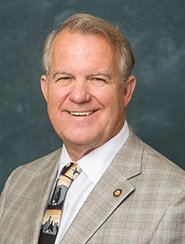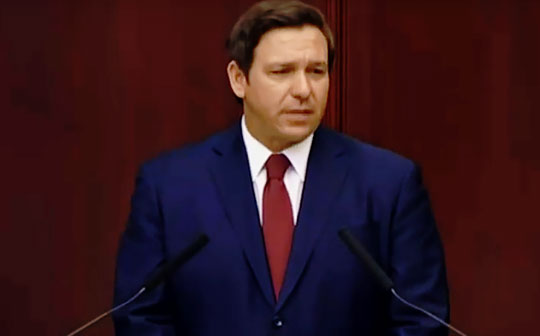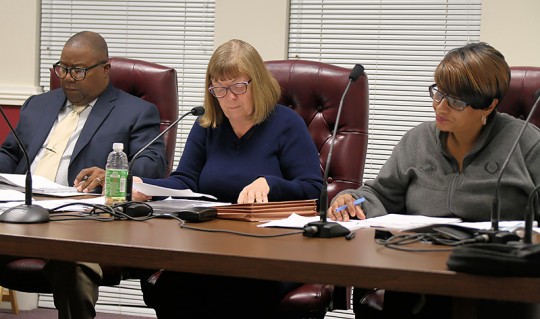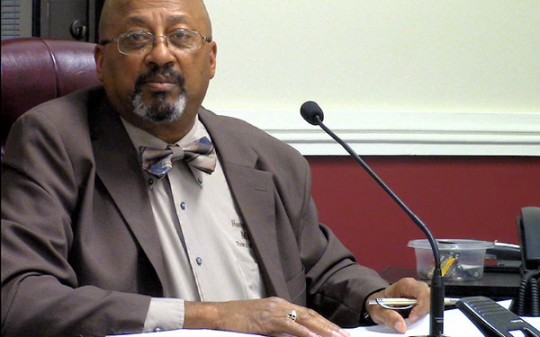Molino Park Elementary Students Celebrate The Arts
March 6, 2019
Molino Park Elementary School held its annual Art Day recently.
For a photo gallery, click here.
 Students spent the day immersed in a variety of fine arts from distinguished guests, such as Deborah Andress, Haley Krostag, Dale Cooey, Lyvonne Patterson, Patsy Pennington, Matt Brabham, Kaye’s Music, Pensacappella, Pensacola Symphony Ensemble, Mr. Mac’s Drum, Twirl Girlz, Schmidt’s Music and the Northview High School Percussion. The day concluded with the “Roundup”, where Heather Leonard’s Danceworks got students on their feet dancing a “Happy Dance” in the school cafeteria.
Students spent the day immersed in a variety of fine arts from distinguished guests, such as Deborah Andress, Haley Krostag, Dale Cooey, Lyvonne Patterson, Patsy Pennington, Matt Brabham, Kaye’s Music, Pensacappella, Pensacola Symphony Ensemble, Mr. Mac’s Drum, Twirl Girlz, Schmidt’s Music and the Northview High School Percussion. The day concluded with the “Roundup”, where Heather Leonard’s Danceworks got students on their feet dancing a “Happy Dance” in the school cafeteria.
Photos for NorthEscambia.com, click to enlarge.
Softball: Tate Beats Milton; Northview Shuts Out Crestview
March 6, 2019
The Tate Aggies beat the visiting Milton Panthers Tuesday 9-6.
Avery Beauchanie earned the win in the circle for the Lady Aggies, surrendering six runs and seven hit and striking out two in seven innings. At bat, she was 2-4 with a RBI.
Holland went 3-4 to lead Tate. Also for the Aggies: Amber Decoux 2-2, 2R; Shelby McClean 2-3, R; Lilly Locke 1-2, 2R, 2RBI; Madison Holland 3-4, 1R, 3RBI; Gabby Locke R; Hannah Halfacre R; Ryleigh Cawby, R.
The Aggies will travel to Niceville on Friday.
Northview 10, Crestview 0
Northview 4, Crestview 4 (tied)
The Northview Chiefs shut out Crestview Tuesday 10-0 in Bratt.
Tori Herrington earned the win striking out six.
Also for Northview: Aubree Love 2-2, 2R, 2RBI; BB Watson 2-3, 2R; Kendall Enfinger 2RBI; Makayla Jeneske 1-2, R; Navaeh Brown 1-2, RBI, R; Katlin Gafford RBI.
The Chiefs will host Chipley on Thursday with JV at 4:00, varsity at 6:00.
Pensacola Bay Ferry Service To Return With New Operator
March 6, 2019
The National Park Service and HMS Ferries, Inc. have signed a 10 year concessions contract for the operation of Pensacola Bay Cruises. HMS will immediately begin preparing for the 2019 season. Service startup date, schedule, prices, and other details will be announced as soon as they are available. Tickets for regular service will be all-day hop-on, hop-off, and discounts may be offered for children, military, seniors, groups, and frequent riders. Park entrance fees are waived for visitors arriving at Fort Pickens via Pensacola Bay Cruises.
“We’re excited to start working with HMS Ferries, Inc. and to see this wonderful opportunity return to Gulf Islands National Seashore this spring,” said Superintendent Dan Brown. The service provides the community and visitors a unique way to experience the exceptional marine resources of Pensacola Bay and provides an attractive transportation option between Pensacola, Pensacola Beach, and Fort Pickens. Each leg of the triangular route passes through national seashore waters, which encircle Santa Rosa Island. Pensacola Bay Cruises will operate seasonally during the spring, summer and fall recreation season.
Pensacola Bay Cruises’ 150 passenger boats, named Turtle Runner and Pelican Perch, were built with funds received via a post-Deepwater Horizon oil spill settlement reached with BP. The settlement earmarked some funds specifically to compensate the public for the temporary lost use of the national seashore beaches and waters. The settlement earmarked other funds for restoration of the park’s natural resources injured by the spill.
HMS (Hornblower Maritime Services) has over 25 years of experience in the maritime industry, and currently operates boat cruises and ferries at locations across the country including the Mobile Bay and Gees Bend ferries in Alabama, and St. Johns River ferry in Jacksonville, Florida. They bring an experienced and capable team to the operation at Gulf Islands National Seashore and its community partners.
DeSantis Calls For ‘Bold’ Action In State Of State Address
March 6, 2019
While focusing heavily on now-familiar priorities such as the environment and education, Gov. Ron DeSantis on Tuesday used his first State of the State address to emphasize a need to take “bold” action.
In a 34-minute speech to lawmakers gathered in a joint session in the flower-filled House chamber, DeSantis touted issues that he has discussed during appearances across the state since taking office Jan. 8. They included efforts to improve water quality, expand school choice and prevent so-called sanctuary cities.
He repeatedly used the word “bold” to describe his agenda and to urge lawmakers to take action.
“Let’s fight the good fight, let’s finish the race, let’s keep the faith so that when Floridians look back on the fruits of this session, they will see it as one of our state’s finest hours,” he said in the address, the traditional start to the 60-day legislative session.
DeSantis, a former Republican congressman, was elected in November without experience in Tallahassee. But since his inauguration, DeSantis has bounced across the state announcing policy priorities.
Some of his actions, such as an initiative to improve water quality, have generally received bipartisan support. That initiative came after parts of Southeast Florida and Southwest Florida were plagued by red tide and toxic algae last year. DeSantis quickly focused on the environmental efforts during the State of the State.
“Florida is blessed with some of the nation’s finest natural resources,” he said. “We’re the fishing and boating capital of the United States. Our beaches bring millions of tourists to our state each and every year. The state’s unique natural environment is central to our economy, our quality of life and our identity as Floridians. I’m proud to have taken swift and bold action to protect our natural resources and improve Florida’s water quality.”
But other priorities have been more controversial, with DeSantis’ push to expand school vouchers likely to spur a major debate during the session. To make the issue more personal, DeSantis on Tuesday introduced Shareka Wright, an Orlando garbage-truck driver and single mother of three who could benefit from expanded school choice programs.
“We are a big, diverse state, and one size doesn’t fit all when it comes to education,” DeSantis said. “Let’s stand with working moms like Shareka and empower them to choose the best learning environment for their kids.”
Senate Minority Leader Audrey Gibson, D-Jacksonville, said in a televised response to the State of the State address that DeSantis should focus on providing high quality education in public schools.
“While the governor says his plan is about helping kids get a better education, especially disadvantaged kids, make no mistake about it, the plan is all about draining millions of your tax dollars to give to private schools, while dismembering public education in the state of Florida where the accountability and transparency parents seek and expect is already built into the public school system,” Gibson said. “None of these factors are guaranteed in publicly funded private schools because none of it is required.”
Sen. Jose Javier Rodriguez, D-Miami, said DeSantis also is not adequately addressing issues such as climate change and access to health care.
“When it comes to most water policy, the governor has taken concrete steps to move us forward,” Rodriguez said. “Everywhere else, he has either continued bad policy or signaled that he’d like to, on the most important issues in our state.”
But with Republicans holding a massive majority in the House and a solid majority in the Senate, Democrats have relatively little power to block DeSantis’ agenda — if he can nail down support from Republicans. At least in some areas, such as expanding school choice, he appears to have support in both chambers.
Similarly, DeSantis’ controversial push to ban “sanctuary cities” has already started moving forward in the Senate. The push is intended to ensure local governments in Florida comply with requests from federal immigration authorities.
DeSantis on Tuesday cited a Jacksonville couple, Bobby and Kiyan Michael, whose son was killed by someone who was in the country illegally after being deported twice, the governor said.
“Florida will not be a sanctuary state — we will not allow someone here illegally to commit criminal misconduct and simply be returned to our communities.,” DeSantis said. “And we won’t tolerate sanctuary cities that actively frustrate law enforcement by shielding criminal aliens from accountability at the expense of public safety.”
For the complete text of the State of State address, click here.
— News Service Assignment Manager Tom Urban contributed to this report.
by Jim Saunders, The News Service of Florida
Complete Text Of Gov. DeSantis State Of The State Address
March 6, 2019
Gov. Ron DeSantis delivered his State of the State address on Tuesday. For details and analysis click here. The complete text of the address, as prepared for deliver, is below:
Mr. President, Mr. Speaker, members of the House and Senate, Cabinet members and Supreme Court Justices:
Mindful of the economic opportunities that lie before us, understanding the environmental challenges that require our attention, and conscious of our obligations to education and public safety, I consider myself blessed to stand before you, at this particular moment in our history, as Florida’s 46th governor.
I’m grateful for your willingness to serve, I’m proud of the accomplishments of our state and its citizens, and I’m optimistic that this legislative session provides us with a unique opportunity to advance needed reforms in a variety of different areas that will strengthen our state and benefit the people now and in the future.
Having spent three terms in a different legislature, a prison known as the US House of Representatives, it is quite a privilege to be able to work with a legislative body that has demonstrated the ability to get things done and to lead. I’ve already seen it firsthand.
Two years ago, the Florida Legislature unanimously passed a resolution acknowledging and apologizing for the “gross injustices” perpetrated, in the middle of the last century, against four African-American men — Charles Greenlee, Walter Irvin, Samuel Shephard, and Ernest Thomas — known as the Groveland Four.
The resolution requested that the Governor review their cases and issue pardons for these men.
Upon taking office in January, I took action. Joined by our Cabinet members, I approved pardons for all four men a few days into my term. It’s never too late to do the right thing.
In the gallery today is Carol Greenlee, the daughter of Charles Greenlee. Her father passed away in 2012 but I hope he — as well as the rest of the Groveland Four — is looking down with some satisfaction that justice, however imperfect, eventually prevailed,
And that we here today are united in insisting that the constitutional protections central to a free society are honored for all of our citizens.
Members of the House and Senate, thank you for leading the way.
I observed during my inaugural address that, in the words of Alexander Hamilton, energy in the executive is the leading character in the definition of good government.
I believe it and I’ve worked to exemplify it.
In less than 60 days, my administration has taken bold action to address issues that Floridians care about:
— Reorienting our environmental policy around the goal of cleaning up our water.
— Announcing far-reaching education reforms designed to make Florida No. 1 in skills-based education by 2030.
— Securing hundreds of millions of dollars for storm-ravaged parts of Northwest Florida.
— Bringing accountability to entities ranging from the Broward Sheriff’s Office to the South Florida Water Management District.
— And appointing three spectacular justices to our Supreme Court.
And this is just the beginning.
I’m proud to recognize the efforts of my wife Casey. She has been by my side as we have toured the state and has also blazed her own trail on issues like education, disaster relief and freedom for the people of Venezuela. She has worked so hard and one thing is clear: we have a great First Lady.
I’m convinced that this whole Governor thing is just a way for the people of Florida to have Casey as their First Lady.
Our kids Madison and Mason have taken over the Governor’s mansion but the baby-proofing has been successful — I can report that no artifacts of Florida history have yet to be destroyed. But stay tuned — Mason will be walking very soon.
Just last week, Casey traveled to Northwest Florida to survey the Hurricane Michael recovery efforts. We have both been to the region several times over the past few months.
To the people of Northwest Florida: we pledged to stand with you as you work to rebuild your communities stronger than before – and we have followed through on that pledge.
I’ve already traveled to Washington, D.C. and secured a historic commitment from the Trump administration to provide assistance to the communities that Michael battered.
My administration has worked to cut through red tape to expedite relief efforts and, thanks to the leadership of your former colleague Jared Moskowitz, we are making great progress.
Here with us today is Mayor Al Cathey and Administrator Tanya Castro from Mexico Beach, which was ground zero for Hurricane Michael’s wrath. They and many others affected by the storm have displayed remarkable resilience in the face of huge obstacles. They deserve our admiration — and our support.
These communities will not be rebuilt in days, weeks or months, but they will be rebuilt. They will be rebuilt because we as Floridians will answer the call as we always do. God bless the good people of Northwest Florida.
Executive energy and leadership are necessary to meet fully the challenges that are before us — but they are not sufficient. In a constitutional system with separated powers, we — the political branches — must work together so we can build off the foundation that has been laid and set the stage for the future success of our state.
How can we accomplish this task? I answer simply: be bold — be bold in championing economic opportunity, be bold in protecting Florida’s environment, be bold in improving education, be bold in defending the safety of our communities, be bold because while perfection is not attainable, if we aim high we can achieve excellence.
ENVIRONMENT
Florida is blessed with some of the nation’s finest natural resources. We are the fishing and boating capital of the United States. Our beaches bring millions of tourists to our state each and every year. The state’s unique natural environment is central to our economy, our quality of life, and our identity as Floridians.
I’m proud to have taken swift and bold action to protect our natural resources and improve Florida’s water quality.
We are repositioning our water policy to meet the needs of our citizens, by, among other things:
— Expediting key projects like the EAA reservoir and raising the Tamiami Trail.
— Establishing a blue-green algae task force to develop policies to fight algae blooms, fight red tide and improve water quality.
— And appointing a Chief Science Officer to better harness scientific data and research in service of Florida’s most pressing environmental needs.
I’ve requested $2.5 billion over the next four years for water resources projects and Everglades restoration. This represents a $1 billion increase compared to the previous four years and will allow us to bring major projects to completion. Given the persistent water problems we have seen over the past several years, now is the time to be bold.
We cannot leave for tomorrow that which we can do today.
Because the people of Florida should have confidence that their interests are being reflected in policy implementation, I asked and received the resignations of all members on the South Florida Water Management District. We needed a fresh start and I’m pleased to report that I’ve appointed a number of good people to this board.
We have a bold vision, we have good folks in key positions, and with your support for these initiatives, we will restore and preserve the beauty of Florida for generations to come.
ECONOMY/JOBS
It is often said that states serve as laboratories of democracies and we are in the midst of a great experiment among the states regarding taxation and government spending.
The result has been a migration of wealth from states that tax heavily, spend profligately, and regulate excessively to states, like Florida, that tax lightly, spend conservatively, and regulate reasonably.
In the face of these trends, some of the states that have hemorrhaged businesses and taxpayers have decided to double down by raising existing taxes and imposing new taxes. As George Harrison once observed: If you get too cold, they tax the heat; If you take a walk, they tax your feet.
We are a mobile, highly-connected society and as taxes become more onerous and as the business climate deteriorates in these states, people vote with their feet.
Taxpayers and businesses leave.
The tax base erodes and the fiscal situations of these states gets more ominous, yielding massive budget shortfalls.
It is a vicious cycle.
We won’t repeat those mistakes in Florida.
We will always remain a low-tax state.
And we will never have an income tax!
I have proposed more than $330 million in tax relief for Florida families, including a property tax cut.
We must keep our economic momentum going!
To those doing business in states that have a bad business and political climate, my message is this: come to Florida. We will maintain a healthy economic environment, we welcome your success and we won’t chase jobs away through economic ignorance and demagoguery.
We are also committed to modernizing our infrastructure, and I know President Galvano is focused on making that happen.Thank you, Mr. President for your efforts.
There are areas where Florida can do better. I hope the Legislature passes legislation to reform the issue of AOB, which has become a racket.
And it’s clear we need reform of our occupational licensing regime, which borders on the absurd and primarily serves to frustrate opportunities for Floridians.
You can become a sniper in the Marine Corps by completing training for 79 days, which equates to 632 hours; becoming a licensed interior designer in Florida requires 1,760 hours.
You can earn jump wings by completing Army Jump School in three weeks, or about 168 hours; Florida law requires 1,200 hours to become licensed as a barber.
Our DBPR secretary and your former colleague Halsey Beshears has identified a number of these requirements that need to be streamlined, rolled back or eliminated. This project merits your support.
EDUCATION
Maintaining low taxes and a healthy economic climate are important, but the most important factor regarding Florida’s economic potential is human capital.
If we support our university system, our state colleges and primary and secondary education, as well as the reforms needed to improve educational opportunities across the board, then we will be setting the stage for future economic success that will be the envy of the nation.
As we sow so shall we reap.
I’m proud that Florida’s university system is ranked No. 1 in the nation — ahead of Texas, California and New York. This wasn’t always so; the climb atop the rankings has been remarkable.
I’m not sure how many people outside Florida realize this, so I’m doing my part to spread the word. I was in New York last week meeting with business leaders and stressed this fact and pledged that we will do even more to build a world-class talent pool.
We are poised for growth in finance, technology, health care, aerospace and more — let’s support the continued ascent of our universities so that these industries can grow by employing our own graduates in good, high-paying jobs in our low-tax, business-friendly environment.
Attending a traditional four-year brick-and-ivy institution is one way to get the advanced knowledge and skills necessary for achieving economic success, but we must recognize that it is not the only way — and for many it is not the best way.
Skills-based education offers a focused, and often more cost-effective means, by which students can acquire the tools they need to be successful.
Working with your former speaker and our Commissioner of Education Richard Corcoran, I have proposed a plan to take Florida from middle of the pack to No. 1 in workforce education by 2030.
Earlier this year, I visited Tampa Bay Technical High School to observe a successful example of workforce education first-hand. I met Glenn Wester III, who is with us here today. Glenn is a junior in the welding program and, even though he is not quite old enough, has already received job offers — good paying job offers! He is also taking Advanced Placement courses and will have to choose between multiple pathways for success.
Glenn, keep working hard, we wish you continued success and I applaud the Hillsborough County School District for giving students like Glenn these opportunities.
Our workforce education initiatives include grants to place students in apprenticeships, money to train teachers in computer science and funds for workforce programs within our state college system. These reforms will make a difference and deserve your support.
Florida has made strides in primary and secondary education since I graduated from public school in Dunedin in 1997, but we have a lot more to do. For years, I’ve heard from parents and teachers about the problems with a system of standards, testing and curriculum modeled after common core. Parents have been especially frustrated by not being able to help their kids with basic math problems.
So I have instructed Commissioner Corcoran to spend the rest of this year engaged in consultation with parents, teachers, school administrators, and employers so that we can replace common core with high-quality curriculum, streamlined testing and a new emphasis on American civics. We want a system that demands excellence and that also engenders public confidence.
We also need to do more to recruit, retain and reward great teachers. To this end, I have proposed replacing Best and Brightest bonus program with a revised $423 million program that will reward more than 40,000 teachers with bonuses approaching $10,000.
I’m also requesting $10 million for a tuition and loan forgiveness program for as many as 1,700 teachers who commit to teaching in Florida schools for five years. Attracting and keeping great teachers in our classrooms should be a high priority.
Education opportunity shouldn’t be limited by parental income or Zip code. One way Florida has expanded opportunity has been through the Tax Credit Scholarship program for students from low-income families. More than 100,000 students — nearly 70 percent of whom are African-American or Hispanic, with an average family income of roughly $26,000 per year — are utilizing the scholarship.
The results have been positive: the Urban Institute recently released a study that found tax credit scholarship students are 43 percent more likely to attend a four-year college and up to 20 percent more likely to obtain a bachelor’s degree. Students who use the scholarship more than four years are up to 99 percent more likely to attend college and up to 45 percent more likely to earn a bachelor’s degree.
More low-income families would like the opportunity to obtain a scholarship for their kids. There are currently 14,000 students who qualify for the scholarship but are stuck on the waiting list.
Shareka Wright is a single mother of three who supports her family by driving a garbage truck for the city of Orlando. While one of her sons is doing well in an Orange County district school, her two younger boys needed a different environment, as one struggled academically and the other was bullied. But because her boys are on the waiting list for the tax credit scholarship program, Shareka might not be able to afford to keep them in this more favorable environment.
Shareka is doing her best to give her boys a better future. I’m not satisfied to see hard-working parents like Shareka mired on a waitlist, and so I’m proposing to eliminate the waitlist by creating a new Equal Opportunity Scholarship that is similar to the tax credit scholarship.
We are a big, diverse state and one size doesn’t fit all when it comes to education. Let’s stand with working moms like Shareka and empower them to choose the best learning environment for their kids.
We also need to stand by students with special needs and their families. That means eliminating the waitlist of 1,900 students for Gardiner Scholarships.
Donna and Michael Holt are here with their son Levi, who has Down syndrome. Levi is on the waiting list for a Gardiner scholarship. Students like Levi have unique abilities that require a customized learning environment that the Gardiner ESA can provide.
The Gardiner scholarship is our way of saying that everyone counts and that these are lives worth living.
And while we are at it, I wholeheartedly reject the callous disregard for human life displayed by the Governors of Virginia and New York. We won’t allow that to happen in Florida.
HEALTH CARE
We need to enact policies to make health insurance, prescription drugs and medical care more affordable for Floridians.
As you are aware, health care is being hotly debated at the national level, so let me say:
Any proposal that seeks to eliminate the private health insurance policies of millions of Floridians is unacceptable. Government has no right to take away the policies that Floridians earn through their jobs or purchase on the individual market.
I want Floridians to be able to purchase prescription drugs from Canada at lower prices. There is an avenue under existing federal law to accomplish this; the President is supportive of this effort and has asked me to plow ahead, which will require navigating an institutionally hostile bureaucracy.
This could save money for individuals, reduce costs for businesses and relieve pressure on our state budget.
I’m also open to any ideas that the Legislature has to tackle this problem. One thing is clear: Floridians need relief from the rising costs of prescription drugs.
Bringing price transparency to health care can also help reduce costs, and I have instructed Secretary Mayhew from AHCA to expedite the price transparency database that the Legislature required. To make the tool effective, we need legislation to provide for shared savings policies so that patients receive a financial benefit when they choose a more cost-effective option.
I’m supportive of Speaker Oliva’s call to foster innovation and competition in our health care system. We can’t just continue doing the same thing over and over and expecting a different result.
PUBLIC SAFETY
Last year at this time, the state was still reeling from the massacre at Marjory Stoneman Douglas High School. Out of that tragedy grew the MSD Commission, which earlier this year outlined a series of recommendations to improve security at Florida schools. I support the recommendations and ask that you enact them into law.
These reforms are a testament to the tenacity, courage and character of the families of the Parkland victims. The hard work of those like Ryan Petty and Hunter Pollack, who is with us here today, has already helped save lives and has made our state stronger. They should be commended for their efforts.
I have gotten to know a number of the families and one thing that has stuck with me is something I’ve heard a number of them say: that this was the most preventable school shooting in history.
When I took office, many of the Parkland families felt that there had not been any accountability — at the school district or at the sheriff’s office — for the string of failures that culminated in the massacre. So, I acted by successfully petitioning for a statewide grand jury investigation into school security failures in Broward County and other jurisdictions.
I also suspended Scott Israel as the Sheriff of Broward and replaced him with Gregory Tony. That suspension will come before the Senate soon and the failures of the former sheriff are well-documented. Why any senator would want to thumb his nose at the Parkland families and to eject Sheriff Toney, who is doing a great job and has made history as the first African-American sheriff in Broward history, is beyond me.
But I judge not, lest I be judged.
ILLEGAL IMMIGRATION
Florida will not be a sanctuary state — we won’t allow someone here illegally to commit criminal misconduct and simply be returned to our communities. And we won’t tolerate sanctuary cities that actively frustrate law enforcement by shielding criminal aliens from accountability at the expense of public safety.
Here with us today are two angel parents, Bobby and Kiyan Michael from Jacksonville. Their son Brandon was killed by a foreign national who was illegally in our country and who been deported on two prior occasions. Brandon was a young man engaged to be married, but instead of planning a wedding Bobby and Kiyan had to plan a funeral. Had our laws simply been enforced, Bobby and Kiyan might not have had to bury their son.
Let’s do right by the Michael family; lets prohibit sanctuary cities in Florida.
FOREIGN AFFAIRS
International events usually have a particular resonance in Florida.
Earlier this year, I had a meeting in the Oval Office alongside Senators Rubio and Scott as well as Congressman Diaz-Balart about the dire situation in Venezuela. To the President’s credit, he heeded our advice and recognized Juan Guaidó as the interim president and made clear that the dictator Nicolás Maduro has got to go.
The tragedy in Venezuela is a result of a failed socialist experiment — a system that is hostile to human liberty and contrary to human nature. The tyranny that has resulted is the natural outgrowth of trying to impose this failed ideology on the people of Venezuela.
To the Venezuelan exile community here in Florida, we stand with you and with the people of Venezuela who are seeking freedom and a better future for Venezuela. The eyes of the free world have descended upon Venezuela, and it is imperative that freedom prevail.
We also know that the despair in Venezuela wouldn’t be possible without the nefarious influence of the Cuban government. I applaud the President for allowing the application of Title III of the Libertad Act and support additional efforts to hold the Castro regime accountable.
I would like to see the Castro regime go the way of Maduro and to see a free and democratic Cuba take its place.
I offer my thanks to the Legislature for defending the U.S.-Israel relationship by enacting anti-BDS legislation.
I reject attempts to target Israel for disfavored treatment and will enforce the anti-BDS provisions vigorously. This whole enterprise of targeting Israel for economic harm is such a fraud and merely a cover for anti-Semitism.
In Florida, rest assured that BDS is DOA.
We will be taking a delegation to Israel in May and I look forward to furthering the relationship between Florida and Israel.
CLOSING
(PERSONAL STORY)
The lesson I learned from this is that sometimes it pays to be at the right place, at the right time.
I think we here in this chamber are the right leaders at the right time. After all, many are called to serve in elected office, but only a few are actually entrusted with authority by the voters. Fewer still are presented with the opportunities we see before us today.
Let’s fight the good fight, let’s finish the race, let’s keep the faith so that when Floridians look back on the fruits of this session, they will see it as one of our finest hours.
Grand Jury Releases Scathing Report On Town Of Century, Calls For Utilities To Be Sold, Finds Misappropriations, Financial Emergency
March 5, 2019
An Escambia County grand jury has issued a scathing report as the result of their investigation into the Town of Century.
The Town of Century is in a state of financial emergency and numerous improper actions have been taken by administration, staff and the town council, according to a grand jury report released Tuesday afternoon.
The Grand Jury is calling for additional investigation by the State Auditor General, State Attorney’s Office and Escambia County.
The grand jury found that the town of Century is a state of financial emergency, and the current administration and council have failed to act in the best interest of the community. It is recommending that the town sell its water, sewer and gas operations, and only remain responsible for roads, parks, and land use programs.
The grand jury found numerous serious financial problems within the town….a gas system that has lost over a half million dollars in two years, a water and sewer system that lost $465,000 in two years (2016-2018), payroll checks written on an account without sufficient funds to cover those checks, and routine bills that are regularly not paid on time because sufficient funds are not available.
The grand jury also found loans made in previous years to business owners dating back to 2003, but the loans did not appear on the audit as owed to the town until 2017.
The town also amended a budget improperly and borrowed funds improperly from a restricted account, including $306,134 that must be repaid from 2017. The town previously wrongly borrowed about $2.7 million from the Special Revenue fund and approved a repayment plan of $300 per month — a 750 year repayment schedule.
The grand jury found a “lack of understanding of the requirements of both the Sunshine and Public Record Laws, digital recordings of at least one meeting were lost, numerous public records requests were not responded to in a timely manner, paperwork for an economic development loan to one council member has been lost and cannot be located, and three council members were previously charged with non-criminal violations of the Sunshine Law.
For additional details, click here.
The grand jury findings were as follows:
I. We find that the Town of Century is in a state of financial emergency. The current administration and Council have failed to act in the best interest of the community. Town officials have shown a clear lack of knowledge and understanding as to the operations of a governmental organization.
2. The current administration and Council have failed to prepare and approve a budget that is realistic or financially solvent.
3. We find that the administration and Council have improperly borrowed funds from the gas tax account and the Local Option Sales Tax account.
4. We find that there has been a lack of accountability between the Mayor and supervisors and between supervisors and employees.
5. We find that the Mayor has failed to follow proper procedure when approving the use of Town equipment and manpower on private property. This appears to be as a result of a misunderstanding of public purpose and the definition of private and public property. Regular consultation with the Town’s attorney may prevent this type of misunderstanding in the future.
6. We recommend that Century sell the assets of its utility services, sanitation, natural gas, and water and sewer, and use the proceeds to repay the amounts borrowed from the restricted fund. The loss of
customers and problems with the operation of these services make it unlikely that they can ever consistently produce a profit for the Town in the future.
7. Amendments should be made to the Charter or ordinances to provide that the Town will be solely responsible for roads, parks, and land use programs.
8. We recommend that this matter be brought to the attention of the State Auditor General’s Office and that forensic financial audits be done for the past five years. Any irregularities should be referred lo the appropriate agencies, including professional licensing boards if such action is warranted. All contracts for third party professional services should be audited as well.
9. We recommend that Century seek the assistance of a municipal consulting firm to assist in the development of policies and procedures. As part of this process we recommend that an operational audit be done. These policies should provide both job descriptions and salary ranges. All employee benefits should be consistent with industry standards. Employee handbooks should be updated and should contain an anti-nepotism provision. The Florida League of Cities may be able to assist in this matter.
10. All loans by Century should be clearly listed on all appropriate financial statements. No person who has an outstanding loan from the Town should be able to run for any Century public office. Loans should not be made to any Town employee or official.
11.We have heard testimony that there is a lack of written contracts and that contracts do not have expiration dates. All contracts should be reviewed and amended as necessary. All businesses or individuals providing professional services to the Town should have written contracts containing appropriate expiration dates.
12.We recommend additional training in the area of Sunshine and Public Records. This may be done by the Town’s attorney, the First Amendment Foundation or the Attorney General’s Office. We request that the Office of the State Attorney continue to investigate allegations of missing public records as well as the failure to properly respond to public records requests.
13.We recommend that before funds are spent that they be clearly allocated and approved. We have heard testimony that economic development funds may have been spent without proper county approval. In addition, all expenditures must comply with the limitations set forth in the Town Charter.
14.The State of Florida and Escambia County should investigate the misappropriation of gas tax and LOST funds.
15.Spending restrictions should be placed on any funds provided by outside governmental entities that are not otherwise limited in their use. Prior approval should be obtained by the Town before these funds are spent. Specifically, before any funds provided to the Town of Century by Escambia County can be spent, the County should review the proposed expenditure and determine that such expenditure is appropriate.
Pictured top: Century Council members (L-R) Luis Gomez, Jr., Ann Cofield Brooks and Sandra McMurray Jackson at a December 17, 2018, meeting. The three received civil fines last month for non-criminal violations of the Sunshine law. NorthEscambia.com photo, click to enlarge.
Residents Invited To Weigh In On Type 2 Diabetes in Escambia County
March 5, 2019
On March 6, the Community Health Implementation Plan (CHIP) Workgroup is inviting the community to a public forum to discuss the root causes and solutions to type 2 diabetes in Escambia County. This is an opportunity for the community to get involved by contributing ideas, feedback, or resources to address the increasing diabetes burden in Escambia County.
The forum will be held Wednesday, March 6 at 10 a.m. in the West Florida Public Library Conference Room at 239 North Spring Street.
The CHIP workgroup was established in 2016, following the release of the Community Health Needs Assessment (CHNA) to address issues surrounding healthy weight status and food access. This workgroup brings together community organizations and resources to develop actionable goals and objectives for addressing these health priorities in the community. With the new health priorities set in the 2019 CHNA, the focus of this group will be type 2 diabetes.
According to the Florida Department of Health in Escambia County, 16.4 percent of residents currently have type 2 diabetes, and 9.3 percent of residents have pre-diabetes. Type 2 diabetes is a condition in the body where sugar is not properly processed. If left untreated, it can lead to major medical issues, such as amputation and blindness. Pre-diabetes is a condition of elevated blood sugar, and if left untreated, can become type 2 diabetes.
Assignment of Benefits Bill Back On Track After Broxson Overhaul
March 5, 2019
Three weeks after the issue stalled, a Senate committee Monday moved forward with a proposal that would revamp the controversial insurance practice known as “assignment of benefits.”
 The Senate Banking and Insurance Committee voted 5-3 to approve the proposal, which Chairman Doug Broxson, R-Gulf Breeze, overhauled after an earlier version did not have enough support to get out of the committee.
The Senate Banking and Insurance Committee voted 5-3 to approve the proposal, which Chairman Doug Broxson, R-Gulf Breeze, overhauled after an earlier version did not have enough support to get out of the committee.
With the 60-day legislative session starting Tuesday, assignment of benefits is the biggest insurance battleground of the year. On Monday, insurers and business groups lined up behind Broxson’s proposal (SB 122), while plaintiffs’ attorneys and several officials from home-repair and windshield-repair firms were opposed.
In assignment of benefits, property owners in need of repairs sign over benefits to contractors, who ultimately pursue payments from insurance companies. Insurers contend that the practice has become riddled with fraud and litigation, while plaintiffs’ attorneys and other groups say it helps make sure claims are properly paid.
The controversy originally centered on water-damage claims to homes in South Florida, but it has moved to other parts of the state and insurance claims for windshield damage.
State Chief Financial Officer Jimmy Patronis appeared at the Senate committee and implored lawmakers to address the issue, which he said is driving up insurance premiums. He also pointed to the divisions among groups lobbying on what is known in the Capitol by the shorthand “AOB.”
“All we’ve got is 60 days to fix this,” Patronis said. “And if we don’t do anything for another 60 days, then we’re just sticking the citizens of the state of Florida with another higher bill because we will continue to pass on the struggles and frustrations that these sides will not get together to discuss and work out. So unfortunately, sometimes you have to be the adult in the room and force legislation upon them.”
Broxson’s original version of the bill only addressed imposing limits on attorney fees, the main request of insurers and business groups. But he had to pull back the proposal after Sen. Tom Lee, R-Thonotosassa, joined Democrats on the committee in opposing it.
The revamped proposal was broader than the original version and won the support of Lee. But it created the same divisions as the earlier version among interest groups.
The proposal, in part, would place limits on assignment of benefits in emergency circumstances. It would include a maximum payment of $3,000, or 1 percent of a homeowner’s coverage limit, when AOBs are used for emergency repairs to homes.
The bill also would place a series of restrictions on AOBs that are outside of emergency repairs. For example, it would set time frames in which consumers could rescind the assignment of benefits. Also, it would revamp attorney fees in disputes between insurers and contractors. The bill would allow the “prevailing party” in such cases to receive attorney fees from the other side.
Critics of the proposal argued it was tilted toward insurers. Lee Jacobson, an Orlando attorney, raised concerns about issues such as the $3,000, or 1 percent, limit on AOBs for emergency repairs to homes.
“When someone is standing ankle deep, they don’t want to be told that their senator voted for a bill that caps damages at 1 percent of what they paid premiums for,” Jacobson said.
But state Insurance Commissioner David Altmaier supported the bill, issuing a statement calling Monday’s vote a “win for consumers across our state.”
“Addressing the AOB crisis will remain a top priority in the coming weeks and months,” Altmaier said. “We must protect Floridians from the bad actors who seek to maximize profits at the expense of every policyholder in our state.”
by Jim Saunders, The News Service of Florida
Public Records Requests For Airline Receipts Unanswered; Mayor Still Says County Approved Purchases
March 5, 2019
Update: NorthEscambia.com has received a partial response to our records requests referenced in this article. We are reviewing documentation and will publish an updated story soon.
Weeks after calling an Escambia County commissioner “a lie” over repayment for over $1,600 in airline travel, Century Mayor Henry Hawkins has yet to produce receipts for the tickets in response to requests from the town council president and NorthEscambia.com.
Hawkins told the town council in January that he spoke to Commissioner Steven Barry who promised reimbursement with county economic development funds. Barry denied the conversation ever took place with Hawkins or anyone else regarding airline tickets and reiterated that such an expenditure would require the approval of the entire county commission.
During a subsequent public meeting, Hawkins called Barry “a lie”. “Just like he called me a lie, I’ll call him a lie,” Hawkins said.
On January 8, NorthEscambia.com made a public records request for emails between the town and Barry related to travel or economic development funds, the airline invoices or receipts and reservation information. As of Monday, March 4, no response had been received.
Monday night, Council President Ann Brooks asked Hawkins why he has yet to respond to her request for the airline ticket receipts, and he said he had signed a confidentiality agreement with an unspecified party. He told Brooks he would “black out” information on the receipts and provide them.
“Mrs. Brooks, I told you before that I got the OK from the county,” the mayor said Monday night. “…I’m not going to rehash this again.”
“But I want the receipts,” Brooks responded.
“I’ll black them out and give them to you,” he said. He also told Reynolds during a council meeting that he would provide the information to NorthEscambia.com, but it would be redacted. Hawkins refused to answer questions about the legal justification for the proposed redactions.
The following charges for airlines or travel services appear on the bill list presented to the town council in December:
- American Airlines $501.40
- Delta Air Lines $366.90
- Expedia $560.92
- Frontier Airlines $214.90
The charges, according to the town’s bill list, were incurred in October.
Under the town’s charter, Hawkins is required to seek advance council approval for purchases in excess of $200.
Escambia Set To Settle Federal Lawsuit Over County Website Accessibility
March 5, 2019
The Escambia County Commission this week will vote on a proposed settlement with a man that filed a federal suit claiming the county website is inaccessible to blind and visually impaired individuals.
Walter Joseph Beckman claimed the website at www.myescambia.com is in violation of Title II of the Americans With Disabilities Act. Title II of the ADA prohibits local governments from excluding qualified individuals with a disability from participation in or the benefits from services, programs or activities of the local government.
A recent decision of the U.S. District Court, Southern District of Florida, has held that the obligations imposed on local governments under Title II are different that those imposed on private or commercial entities under Title III where access to public accommodations is accomplished through their websites.
The proposed settlement under consideration includes payment of $13,800 for attorney’s fees and costs, and $1,000 for alleged damages to Beckman. In addition, the settlement agreement gives the county until the end of the year to make the website accessible to blind and visually impaired individuals subsequent to December 31, 2019.
The Escambia County website is produced in-house.









